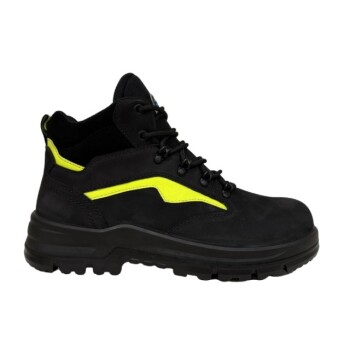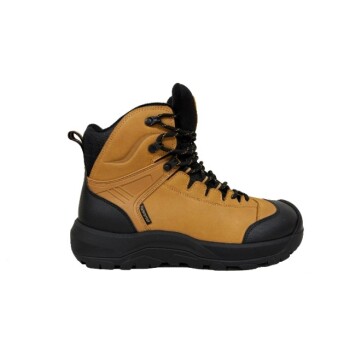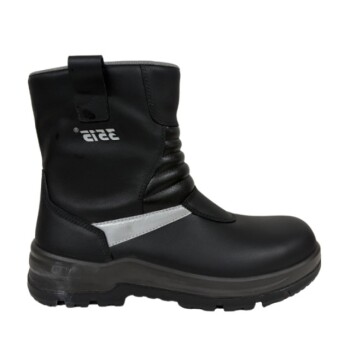Wellington boots are essential protective footwear for a wide range of professionals, particularly those working in wet, muddy, or unhygienic conditions. Workers in agriculture, fishing, landscaping, food processing, and construction frequently rely on them for protection against water, chemicals, and physical hazards.
The core value of a professional Wellington boot is not just its ability to keep feet dry. It serves as an impermeable barrier, protecting the wearer from environmental hazards ranging from simple mud and water to harsh chemicals, biological contaminants, and physical impacts.
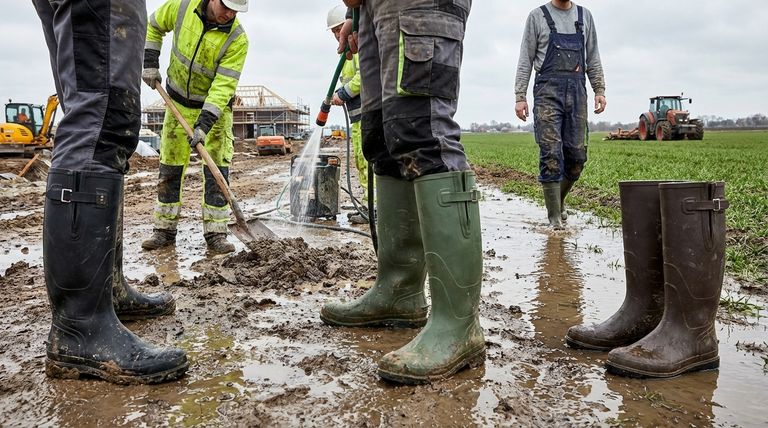
The Core Function: A Barrier Against the Elements
At its most basic level, the Wellington boot is designed to create a seamless shield between the worker's foot and their environment. This function is critical across several demanding sectors.
Unmatched Waterproofing
The primary and most recognized feature is its waterproof design. For landscapers, ranchers, stable hands, and farm workers, this provides essential protection from mud, standing water, and slurry.
Fishermen and aquaculture workers depend on this same feature to stay dry and comfortable for long hours while exposed to water.
Chemical and Contaminant Resistance
Modern Wellington boots are often made from specialized polymers like PVC or nitrile rubber. These materials resist degradation from chemicals, oils, and animal fats.
This makes them indispensable in animal processing plants and other food production facilities, where workers are exposed to both cleaning agents and biological byproducts.
Ease of Sanitation
The smooth, non-porous surface of a Wellington boot is incredibly easy to clean and sanitize. This is a non-negotiable requirement in hygiene-conscious industries.
In food processing and some medical environments, the ability to thoroughly wash down footwear prevents the spread of bacteria and cross-contamination.
The Evolution to Safety Footwear
While traditional Wellingtons offer environmental protection, many industries require integrated safety features. This has led to the development of the Safety Wellington.
Incorporating Toe Protection
Many industrial Wellington boots feature a steel or composite toe cap. This is crucial in construction, agriculture, and manufacturing, where there is a constant risk of foot injury from falling objects or heavy machinery.
Puncture and Slip Resistance
For workers on construction sites or in workshops, a puncture-resistant midsole protects against sharp objects like nails.
Furthermore, specialized outsole designs provide superior grip on slippery surfaces, a vital feature in food processing plants where floors are often wet or oily.
Understanding the Trade-offs
Despite their advantages, Wellington boots are not a universal solution. Understanding their inherent limitations is key to using them correctly.
Breathability and Comfort
The same waterproof quality that makes Wellingtons effective also means they are not breathable. This can lead to discomfort and sweating during long periods of wear, especially in warm conditions.
Ankle Support and Fit
The pull-on design, while convenient, typically offers less ankle support than a well-fitted lace-up boot. This can be a drawback for workers who need to navigate highly uneven or unstable terrain.
Making the Right Choice for Your Goal
Selecting the correct Wellington boot requires a clear understanding of the primary hazards you face in your specific job.
- If your primary focus is agriculture or landscaping: Prioritize deep, mud-shedding treads and durable, waterproof construction.
- If your primary focus is construction or heavy industry: Demand certified safety features, including a protective toe cap and a puncture-resistant midsole.
- If your primary focus is food processing or hygiene-critical environments: Choose boots made from materials resistant to animal fats and aggressive cleaning chemicals, ensuring they are easy to sanitize.
Ultimately, choosing the right Wellington boot means matching its specific protective features to the unique hazards of your work environment.
Summary Table:
| Industry/Profession | Primary Hazards Protected Against | Key Boot Features |
|---|---|---|
| Agriculture & Landscaping | Mud, water, slurry | Deep treads, waterproofing, durability |
| Fishing & Aquaculture | Constant water exposure | Waterproofing, comfort for long wear |
| Food Processing | Water, chemicals, biological contaminants, slippery floors | Chemical resistance, easy sanitation, slip-resistant soles |
| Construction & Heavy Industry | Falling objects, sharp debris, heavy machinery | Steel/composite toe cap, puncture-resistant midsole |
Need reliable Wellington boots for your workforce? As a large-scale manufacturer, 3515 produces a comprehensive range of safety and professional footwear for distributors, brand owners, and bulk clients. Our production capabilities encompass all types of Wellington boots, including models with safety toes, chemical resistance, and superior grip—all designed to meet the specific demands of your industry. Ensure your team has the right protection. Contact 3515 today for a consultation and quote!
Visual Guide
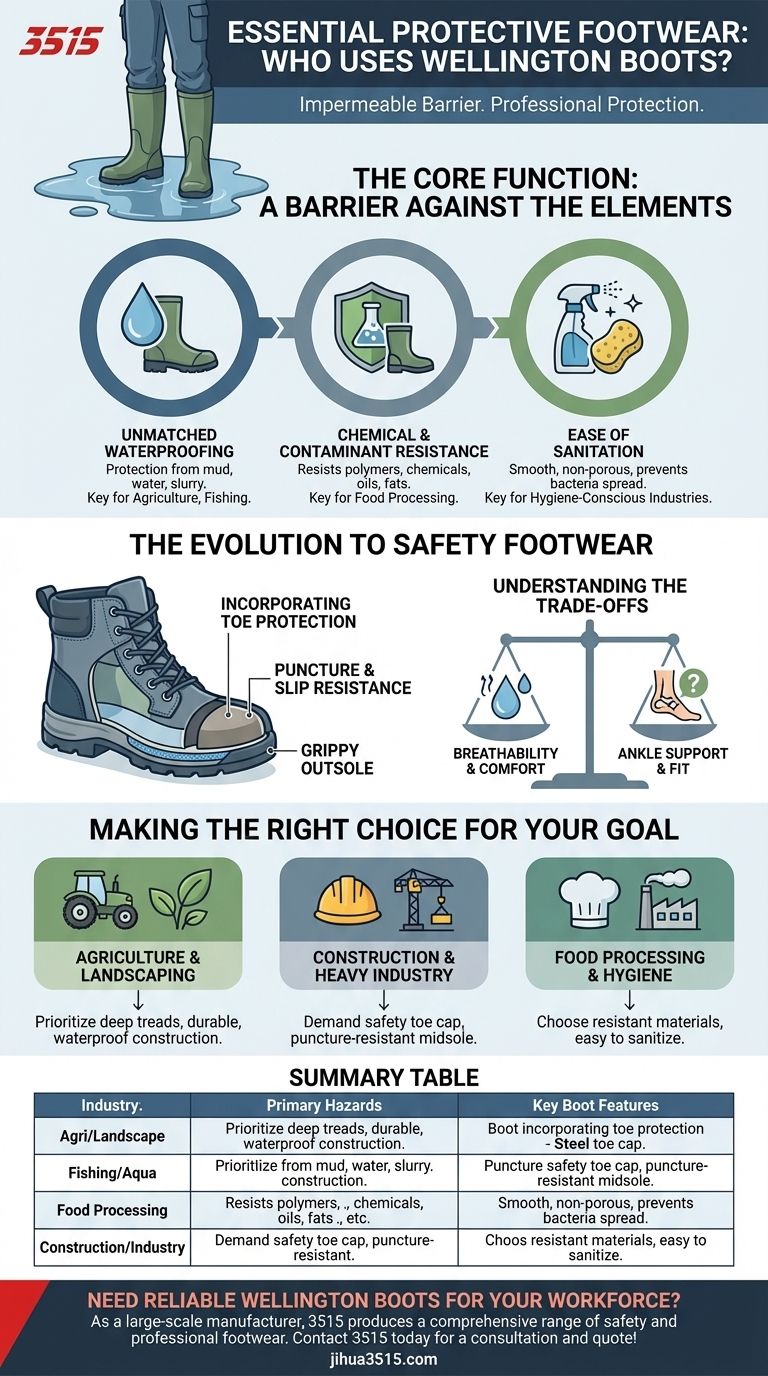
Related Products
- Safety Footwear Wholesale Manufacturer for Custom OEM/ODM Production
- Wholesale Safety Footwear Manufacturer for Bulk & Custom OEM Orders
- Premium Flame-Retardant Waterproof Safety Boots and Shoes
- Wholesale Premium Waterproof Nubuck Safety Shoes Boots
- Premium Insulated Safety Boots and Shoes for Wholesale & Bulk Orders
People Also Ask
- What is the primary function of specialized rubber safety boots in high-risk autopsies? Ensure Viral Fluid Containment
- What problems can occur with frozen boots in winter cycling? Avoid Painful Blisters and Cold Feet
- What are the advantages of using Rubber for work boots? Unbeatable Safety & Durability
- What are the characteristics of Vibram Red X soles? Designed for Extreme Heat & Rugged Terrain
- What are some key features to look for in high-quality oil field boots? Essential Safety & Durability Guide
- How did engineer boots transition from workwear to fashion? From Locomotive to Runway
- How does the height of PVC work boots affect protection? A Guide to Choosing the Right Boot for Your Job
- Why are slip-resistant soles important in work boots? Prevent Slips & Boost Safety



